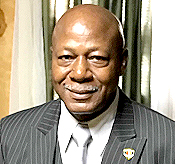Guest commentary by Jerry Burnet, former president, Huntsville/Madison Co. NAACP

Black Americans are among the top consumers in the United States, yet we remain at the bottom of the nation’s wealth-building chain. According to data from Nielsen IQ and the Selig Center for Economic Growth, African Americans have over $1.7 trillion in spending power—a figure that rivals the gross domestic product (GDP) of countries such as Mexico, Saudi Arabia, and the Netherlands. Despite this immense economic strength, our communities continue to hold a disproportionately small share of the nation’s wealth.
According to the Brookings Institution, for every $100 in wealth held by white households, Black households hold only about $15. This stark disparity highlights the fact that while we spend more, we retain far less—a sign that our economic power is being directed outward rather than invested within our own communities.
This reality reveals a painful truth: something is deeply wrong with our spending and investment patterns. As a people, we must find solutions that allow us to redirect our economic power toward building lasting wealth for future generations. We owe it to our children to leave them a stronger financial foundation than the one we inherited.
Although Black Americans have trillions of dollars in spending power, much of that money flows directly into the hands of corporations and businesses that do not hire us, do not live among us, and do not reinvest in our neighborhoods. Ownership of luxury hotels, restaurants, banquet halls, and event centers within the Black community remains limited—not because we lack talent or vision, but because our dollars too often build the wealth of others. The result is a troubling paradox: we live in high-class yet remain financially insecure.
While our consumer power is formidable, our ownership footprint remains small. Only about 3.3% of U.S. employer businesses were Black owned in 2022, according to a report from Axios (2025). This means that most of the contracting, profits, and capital generated by our spending go directly to non-Black-owned businesses.
Money is power—and we already possess that power. The key lies in circulating our dollars within our own communities. If Black consumers intentionally supported Black-owned businesses, and if Black business owners consistently treated their customers with respect and professionalism, we could begin to see real progress in wealth creation, job growth, and community development.
The path forward begins with honest dialogue, collective effort, and accountability. By choosing to build, buy, and believe in ourselves, we can ensure that our economic strength finally works for us—not against us.

